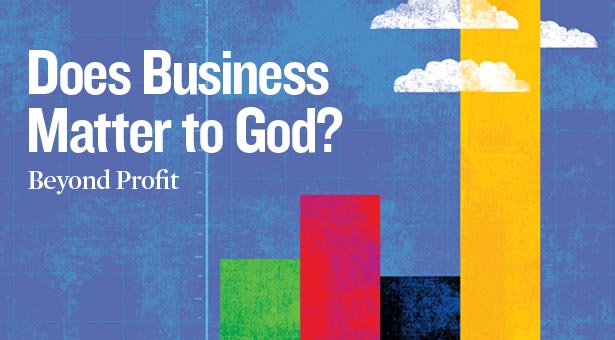
By Jeff Van Duzer | Illustration by Mike Austin
I remember once trying to explain to my dad how the faculty in our business school were wrestling with the question of the “purpose of business.” My dad is a mild-mannered and generally quiet professor of electrical engineering. But as I proceeded with my explanation, I could see him getting more and more agitated. Finally, in a way that was quite uncharacteristic of him, he interrupted me.
“Jeff,” he said. “Everyone knows what the purpose of business is. The purpose of business is to make money.” Or, as we in business school like to say, to maximize the return on shareholders’ investments.
And my dad was right. This is the conventional understanding of business. Almost all public corporations operate under this model. Many private corporations do as well, and virtually all business-school curricula are built on this foundation. Under this model, a business leader with a choice to make is supposed to ask which of the various options, on a risk-adjusted basis, will yield the maximum ROI.
But from a biblical standpoint, we’ve concluded that the conventional approach is incomplete, at best, and probably just wrong. In 2002, the faculty in the School of Business and Economics at Seattle Pacific University began to systematically ask questions about the purpose of business from a theological standpoint. Beginning in Genesis with the creation account and continuing through to the end of Revelation, we sought to identify the defining movements of the grand narrative of Scripture and to ask how each of these movements might shape our understanding of business.
For example, a close look at the Genesis account revealed that in God’s perfect design (that is, before Adam and Eve ate the forbidden fruit), human beings were designed for relationship. They were made in the image of the Trinitarian God. God’s inherent relational character pre-existed any work of creation. The Genesis account reminds us that tasks are always subordinate to relationship. They flow from relationship and are intended to return to enrich the relationship.
“We don’t teach profit as the end of a business. It is the means. The purpose of business is to serve. Profit is the means that enables the business to attract the capital it needs in order for it to pursue its first-order purpose.”
In the creation account, we are also reminded that Adam and Eve were made, in part, for work. Work was not a consequence of the Fall. It was part of God’s perfect design, an aspect of what it meant to be fully human. And it was not just any work but work that mirrored the work of God — meaningful and creative work.
Putting these two observations together, we found a glimpse of God’s first purpose for business. Business excels at bringing people together so that they can engage in meaningful and creative work. This, it seemed to us, was one first-order purpose for business.
Similarly, the Genesis account reminds us that in God’s perfect plan, God intended to “partner” with humanity — to take God’s perfectly resourced creation and to cause it to flourish. The Garden of Eden as originally created was never God’s intended “end-game.” It was always intended to be the starting point. Through the work of men and women, the fields were to flourish and yield their fruit.
This, too, points to business. Of all the institutions in society, only business actually creates economic value. All other institutions — e.g., governments, churches, universities — draw down on the economic value created by business. Whether this takes the form of taxes, tithes, or tuition, in an economic sense, all other institutions are dependent on the capacity of business to make more from less.
A decade after we started our discussion, here is where we have arrived. We believe that from God’s perspective, business exists to serve the community in two key respects: First, business serves by creating economic value in the form of products and services that enable the community to flourish. Second, business serves by providing opportunities for individuals to express aspects of their God-given identities in meaningful and creative work.
But what about profit? Don’t the faculty of SBE care about returns on investment? Of course we do. A great deal of our program focuses on issues of efficiency, cost of capital, and other factors that influence levels of profitability. But here is the difference: We don’t teach profit as the end of a business. It is the means. The purpose of business is to serve. Profit is the means that enables the business to attract the capital that it needs in order for it to pursue its first-order purpose.
Profit is also a constraint. Investors are entitled to a reasonable, risk-adjusted rate of return on their invested capital. Some options that might be service-focused are not within the range of options available to the manager, because they cannot be profitably pursued.
Consider the analogy of blood in the body. Unless blood is circulating in my body, we don't need to talk a lot about my purpose. I’m dead. And, unless profit is circulating inside a business, we don't need to talk about the purpose of that business. It is bankrupt. But which of us gets up in the morning intending to live for the purpose of circulating blood? Blood and profit are absolutely necessary. They just aren’t the purpose.
Under the conventional model, the business leader asks which of the available options on a risk-adjusted basis will maximize ROI. Under our approach, the business leader first asks, “Given the core competencies of my organization and the assets under my control, which of the options will best enable us to profitably serve my community?” These are different questions. Over time, they will produce different answers and lead to different outcomes.
 Jeff Van Duzer is a professor of business law and ethics and dean of the School of Business and Economics
at SPU. He is the author of Why Business Matters to God (IVP Academic, 2010). The book is “a huge contribution to the emerging discussion about what it means to follow Christ in the business world of the twenty-first century,” says William Messenger, executive editor of the Theology of Work Project.
Jeff Van Duzer is a professor of business law and ethics and dean of the School of Business and Economics
at SPU. He is the author of Why Business Matters to God (IVP Academic, 2010). The book is “a huge contribution to the emerging discussion about what it means to follow Christ in the business world of the twenty-first century,” says William Messenger, executive editor of the Theology of Work Project.
